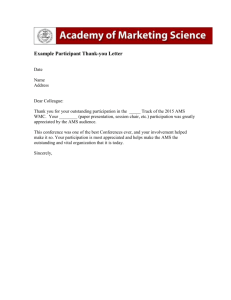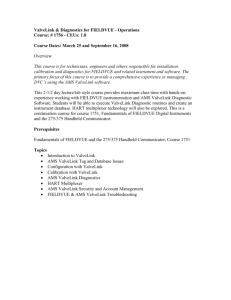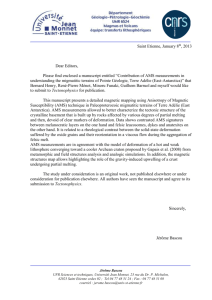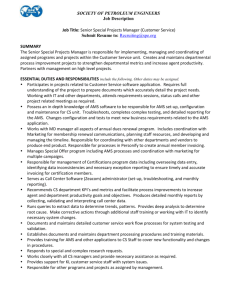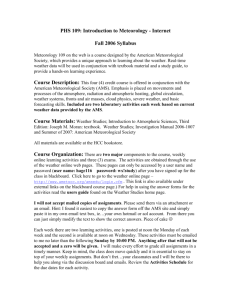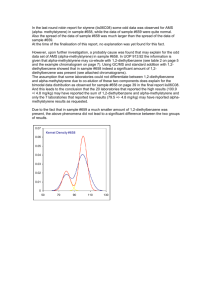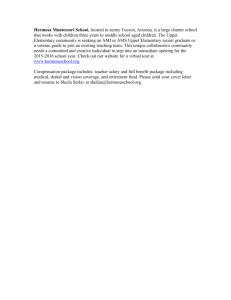AMS Education Program
advertisement
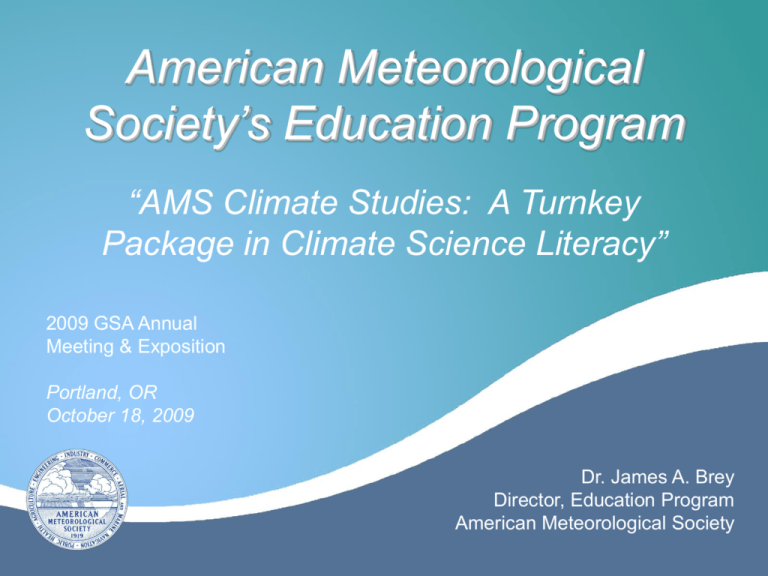
American Meteorological Society’s Education Program “AMS Climate Studies: A Turnkey Package in Climate Science Literacy” 2009 GSA Annual Meeting & Exposition Portland, OR October 18, 2009 Dr. James A. Brey Director, Education Program American Meteorological Society American Meteorological Society • Founded in 1919 • Over 12,000 members • Organizes over a dozen conferences annually • Publishes nine leading journals • Certifies consultants and broadcasters • Significant educational activity since 1990 Our Mission: Promote the development and dissemination of information and education on the atmospheric and related oceanic and hydrologic sciences and the advancement of their professional applications. AMS Education Program Mission To better equip students in science and math by providing: • Substantive professional development opportunities for teachers nationwide • Innovative undergraduate survey course packages licensed to universities, colleges and community colleges This is what we are most concerned with and this is what we do best! Opportunities in our Disciplines • Prepare the next generation of earth scientists by promoting workforce development • Encourage members of underrepresented groups to aspire to an Earth science career • Provide insight into the excitement of Earth system science • Illustrate the rewards provided by an Earth science career • Introduce role models to emulate Realizing the Driving Factors • Global Change Issues • Environmental Hazards • Biodiversity and Environmental Health Globalization • Human Interactions with the Earth System • Technology and Access to Information • Water Issues • Air and Water Quality What are AMS Weather Studies, AMS Ocean Studies & AMS Climate Studies? • Introductory undergraduate courses that place students in a dynamic educational environment where they investigate the atmosphere and world ocean using real-world and real-time environmental data • Emphasis on hands-on laboratory investigations and the development of critical thinking skills • Designed and serviced by AMS and licensed by colleges and universities for local offering/credit • Turnkey package with multiple components • Can be offered in a variety of learning environments • NASA, NOAA and NSF-supported Diversity Projects facilitate implementation at minority serving institutions (MSIs) nationwide AMS Weather Studies • An introductory college-level course on the fundamentals of atmospheric science • Students learn about weather as it happens in near real-time • Nationally implemented in Fall 1999 and licensed by 380 institutions • Course offered to over 40,000 students AMS Ocean Studies • Developed in cooperation with NOAA • Course emphasizes: – Flow and transformations of water and energy – Physical and chemical properties of seawater – Ocean circulation – Interactions between the ocean and Earth system AMS Climate Studies available Fall 2010! • Help your students become responsible, scientifically-literate participants in the discussions that dominate climate science today • Focuses on the science, but also addresses the social and societal impacts that draw the attention of students • The same effective turnkey package as AMS Weather Studies and AMS Ocean Studies • Also, serves as a great primer for students entering technical ‘green’ programs Course Development Background • AMS Undergraduate Faculty Enhancement Program (UFEP), 1994, 1995, NWSTC • AMS DataStreme Atmosphere pre-college teacher enhancement course, 1996- • AMS Weather Studies pilot tested in spring 1999; national implementation fall 1999; licensed by 400 institutions • AMS DataStreme Ocean pre-college teacher enhancement course 2003- • AMS Ocean Studies pilot tested spring 2005; national implementation fall 2005; licensed by 120 institutions • AMS DataStreme Earth’s Climate System pre-college teacher enhancement course 2009- • AMS Climate Studies pilot testing spring 2010; national implementation fall 2010 Course Structure and Components • All three courses are composed of fully-integrated packages, and contain both printed and online learning materials – Comprehensive 15-chapter, full color, hard cover textbook – Investigations Manual with 30 laboratory-style activities – Course website – Faculty website – Faculty resource CD – Course Management System-compatible files The Textbooks • Weather Studies: Introduction to Atmospheric Science, 4th Edition – Authored by Joseph M. Moran • Ocean Studies: Introduction to Oceanography, 2nd Edition – Edited by Joseph M. Moran; M. Grant Gross and Elizabeth Gross were major contributors to 1st Ed. • Climate Studies: Introduction to Climate Science, 1st Edition – Authored by Joseph M. Moran • Case-in-Point • Driving Question • Chapter Narrative • Basic Understandings • Review and Critical Thinking Questions • Essays Investigations Manual • Includes 30 lab-type investigations (two per chapter) • For the Weather course, emphasis is placed on recent meteorological case studies and today’s weather • For the Ocean course, an inflatable globe guides visualization of complex ocean phenomena, including tides, El Niño/La Niña and tsunami trajectories • For the Climate course, students are introduced to the AMS Conceptual Energy Model, easily visualizing the effects of changing atmospheric composition Course Websites • Weekly Weather/Climate News and Weekly Ocean News • Weekly Current Weather Studies, Current Ocean Studies and Current Climate Studies • Daily Weather Summary • Supplemental Information • Links to current environmental data and maps • Student Resources • Semester Archives Faculty Resource Materials • Faculty CD – Faculty Manual – Textbook images suitable for PowerPoint presentations – Test bank questions – Answers to review & critical thinking questions – Course Management Systemcompatible files • Faculty website – Weekly discussions – Answer keys Course Management System Files • Respondus software converts formatted files to Blackboard, WebCT, ANGEL, Desire2Learn, and other CMS files. • CMS files facilitate student response online and automatic grading of responses for instructor. • Respondus-formatted files – Investigations Manual (faculty CD and website) – Current Weather Studies, Current Ocean Studies and Current Climate Studies (faculty website) – Test bank questions (faculty CD) Course Implementation • Course design enables offering by experienced meteorology, oceanography and climate science faculty, as well as by science professors with no prior teaching experience or formal training in the atmospheric or oceanic sciences. • Instructional settings range from traditional lecture-based to totally online. • Students enrolled in the course receive local institutional credit and purchase course materials through their local bookstore • AMS staff and experienced course instructors mentor new faculty National Dissemination Background • The U.S. faces a serious challenge in attracting members of racial and ethnic minority groups to scientific careers • Within the geosciences, minority groups earn 4.6% of all bachelor and 5% of Ph.D. degrees, even though these groups comprise about 27% of the U.S. population • The challenge in attracting minority students is that many college and universities with high minority student populations focus on traditional sciences and do not offer introductory geoscience courses • To help alleviate this problem, AMS makes available AMS Weather Studies, AMS Ocean Studies and AMS Climate Studies and conducts NSF-supported faculty training AMS Diversity Projects • Faculty participants attend expenses-paid, week-long course implementation workshops that cover fundamental course understandings and implementation procedures – Key to these workshops are presentations by NOAA and university scientists along with field trips to science laboratories • Faculty members then present posters on their course implementation at the subsequent AMS Annual Meeting AMS Diversity Projects • AMS Weather Studies Diversity Project – NOAA/NWS Training Center in Kansas City, MO from 2002-2007 – 145 institutions have offered course to over 8,000 students – Anecdotal evidence of students choosing additional science courses and/or indicating intent to pursue meteorology major • AMS Ocean Studies Diversity Project – University of Washington/NOAA facilities in Seattle, WA from 2006-2008 – 77 institutions have already offered course to 1,700 students • We hope to do the same with AMS Climate Studies! Conclusions & Future Directions • AMS Weather Studies, along with AMS Ocean Studies, together have introduced real-world geoscience education to 400+ institutions, many of which had not previously offered a course in these disciplines • Courses encourage additional student explorations of the geosciences, possibly leading to science careers • Turnkey course design and faculty enhancement workshops make possible course introduction at U.S. minority serving institutions and other institutions globally • AMS is building upon its suite of introductory geoscience courses with AMS Climate Studies, available next fall! Acknowledgements & Contacts • AMS Weather Studies was funded by NSF grants GEO-0119740 (OEDG) and DUE-0126032 (CCLI-ND) • AMS Ocean Studies Diversity Project is supported by NSF grant DUE-0442497 (CCLI-ND) • AMS Climate Studies is supported by NASA grant NNX-09AP58G (CCLI-ND) • NOAA and the Univ. of Washington School of Oceanography have also contributed supported the Seattle Diversity Project workshop Dr. James Brey AMS Education Program brey@ametsoc.org (202) 737-1043 American Meteorological Society 1120 G Street, NW, Suite 800 Washington, DC 20005
